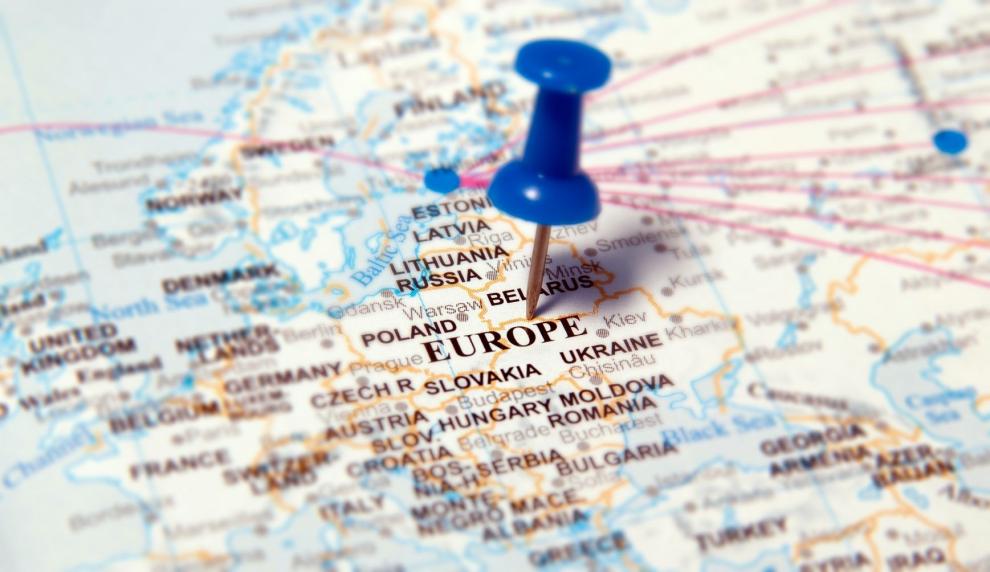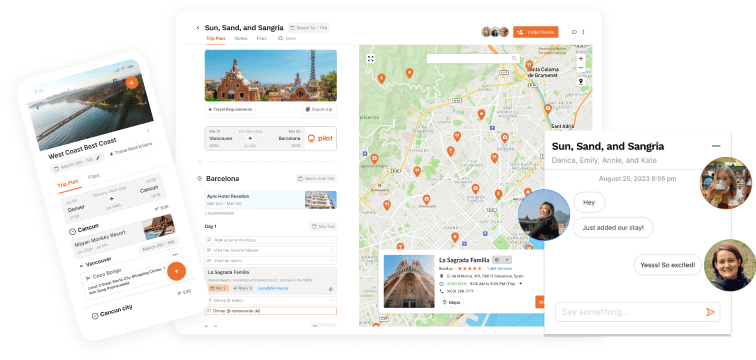Table of Contents
Europe is a destination on every traveler's dream list. The continent is made up of highly varied 27 countries, each boasting its individual captivating culture, history, traditions, and opportunities.
Whether you're thinking about clubbing in Lagos, eating in Rome, bar-hopping in London, or sunbathing on the best beaches on the Amalfi Coast, you can do it all. And if you master the skill of trip planning, you can make this Europe trip one that you'll never forget!
Don't get me wrong, nothing beats spontaneity. But when heading to one of the world's hottest destinations, a little planning goes a long way. Especially if you're a budget-conscious traveler.
Whether you're planning a 2 week Europe trip or a month-long adventure, I've got your back. Ditch the conundrums and unwanted stress with this in-depth guide.
Why visit Europe?
This part of the globe is truly something special. Combining stunning scenery, roaring nightlife, and vibrant cities, Europe has it all. Whether you're interested in an adrenaline-fueled adventure or rich history, this continent has it for you!

The perfect plan in 8 steps
Step 1. Decide on your Europe travel dates
How many days do you need to travel around Europe? Well, that depends on your preferences. Planning a trip to Europe at any time of the year offers a selection of pros and cons. Each season holds the key to unique experiences, like skiing on the Italian slopes in winter or paddleboarding around the Greek islands in the summertime.
Summer: July to August
During Europe's peak travel season, you can expect a lively ambiance and event-fuelled atmosphere. There are tons of big events to suit every taste, such as Notting Hill Carnival, Stockholm Pride, Ultra Music Festival, and the Tour de France, to name a few! The warm weather also provides perfect opportunities for all you watersports enthusiasts and beach devotees.
With peak times come big crowds and high prices, so be prepared to spend a little extra.
Fall/Autumn: September to November
During fall, accommodation, flights, and activities become more affordable, making it the perfect season for budget-conscious travelers. October is a stellar time to tour wineries, national parks, and coastal cities.
If you're interested in outdoor activities or adventure sports, fall is calling your name! One of the biggest highlights in Europe is also during this season, Oktoberfest in Munich!
Winter: December to February
The winter season in Europe brings cooler weather, smaller crowds, and inexpensive accommodation. Although in January, there are fewer events, and many places and some stores and attractions may take a break, it's still an excellent time to experience Europe. Particularly if you love skiing and winter sports!
If you're a fan of Christmas cheer, then December could be the perfect time to plan a trip to Europe. Christmas markets and magical city lights give cities an enchanting fairytale feel. And if you're into colors, costumes, and culture, take advantage of the Carnival of Venice in Italy in February.
Spring: March to May
If you're planning a budget trip to Europe, spring offers more affordable accommodation, flights, and activities than summer. Budget-conscious visitors who love hiking and outdoor activities can enjoy pleasant weather, particularly in Spain and Greece.

Event lovers can enjoy big-time parties like St Patrick's Day in Ireland and Portugal's Óbidos International Chocolate Festival.
After you've nailed down your chosen season, it's time to figure out the length of your trip. You might wonder whether seven days is enough for Europe or if you'll need longer. The answer depends on what you're planning to see and how in-depth.
Of course, there's no wrong time to go to Europe., but I recommend visiting Europe for a minimum of two weeks. Especially if you plan on going to multiple countries.
Step 2. Create your travel budget
What's your travel style? Do you have any specific expectations? When learning how to plan a trip around Europe, one crucial aspect is your budget. Budget differs from person to person, and there's no right or wrong way to do it.
Whether you're a seasoned traveler, a first-timer, or a frugal backpacker, planning your travel budget needs time and attention. Consider which attractions you'll visit, like museums, parks, and day trips. Keeping in mind accommodation and transport costs while you're deciding. Also, will you be eating out every day or cooking in your accommodation?
These are all essential things to consider when planning your trip around Europe. A good rule of thumb is to allow around €100 per person per day, which will vary depending on which part of Europe you're in and your trip plans.
Organizing a budget trip to Europe can be done, and it can be done without scraping around for pennies in your purse! Make the most out of your upcoming European endeavors with these tried-and-tested budget travel tips.

Step 3. Figure out your top destinations
There's so much to see and do in Europe, and planning a trip might feel overwhelming. You can explore the historic cities of Croatia, walk among the ancient ruins in Pompeii, hit the clubs in Copenhagen, or meander through Mykonos' most unique sights.
Whatever your style, there's something for everybody. Each nook and cranny of Europe is soaked with culture, background, and food. Part of the fun in traveling is discovering what makes each place unique! So when planning your trip to Europe, don't worry about seeing everything. Focus on the places that call your name!

Step 4. Decide on your transport
This step is a big one. Especially if you're a budget traveler, transport can greatly influence how well you stick to your budget. So, what's the best way to travel around Europe?
Modern cities like London, Madrid, and Amsterdam have impressive transport options, including taxis, buses, trams, trains, and shared bicycle and scooter systems. When planning your trip around Europe, consider all the different options and factor in time and cost.
Depending on your destination and the time of year you choose, transport availability and prices can vary, so do your research beforehand.

Step 5. Decide on your accommodation
There's a vast range of accommodations in Europe, from budget hostels to luxury escapes. Will you choose hostels? Use Airbnb? Sample the finest hotels?
If you're considering staying in a hotel, comparison websites like Hotels.com are helpful. You can also sign up for alerts on hotel deals to save some extra cash.
Popular tourist destinations like the Amalfi Coast, Barcelona, Lisbon, Santorini, and Berlin have hundreds of attractive accommodation options. They can get booked out fast, so booking in advance is a must!

Step 6. Plan some activities and attractions
Europe is well-known worldwide for its mouth-watering cuisine, rich history, otherworldly architecture, and riveting culture. So, which attractions and activities do you want to experience on your trip?
Think about your travel style again. Does your ultimate European trip involve food-focused outings, adventure sports, historical monuments, or lively events? A lot is going on in Europe, and it's best to plan ahead to avoid missing out.

Here are some ideas to get you started:
- Take a walking tour in Rome
- Exploring museums in Dublin
- See the Duomo in Milan
- Take a day trip to Berlin
- Uncover hidden gems in Prague
- Gondola ride in Venice
- See the top sights in Brussels
- Hike the Cinque Terre
- Stroll through Athens
- Partying in Istanbul
- Sip cocktails on the Amalfi Coast
- Get lost in history in Edinburgh
- Dress up for the Carnival of Venice
Step 7. Finalize your itinerary and organize your travel documents
Now that you know how to plan a European trip, it's time to prepare. Ensure you have a valid passport, travel visa, and travel insurance. For some ideas, check out this guide to the best travel insurance.
Remember, your passport must not expire within 6 months of your travel date to be accepted for travel. You can read more about entry requirements for US citizens on the official US government site.

Step 8. Get packing
Some travelers love this part of the process, and others dread it. Packing can be a chore, but it can also be hassle-free, especially with this complete vacation packing list.
Depending on the season you're traveling, your packing list will vary. As a general rule of thumb, comfortable walking shoes and lightweight clothing are a must. These two items can go a long way, especially if you're planning on seeing the winding streets of Europe.

Cuisine, culture, colorful cities, and more!
Now it's time to practice what you've learned. It's time to forget about the stress and pass it on to Pilot. Planning your ultimate European trip is easy with Pilot. Start the countdown now!










![Paris Neighborhoods Guide [2024]: Areas to Visit & Avoid!](https://assets-global.website-files.com/63d1baf79ce0eb802868785b/65b947376eff1a3e72606d03_Paris%20Neighborhoods%20Guide.jpg)
